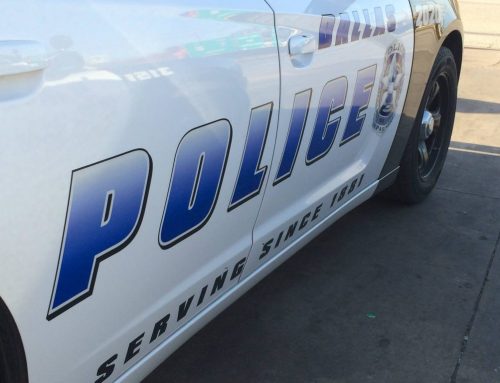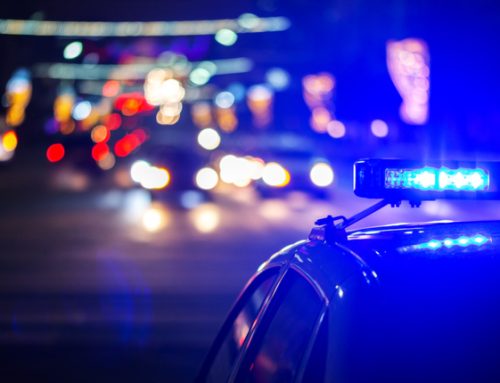It’s 10:30 p.m. on a Thursday night. Giant thunderheads rumble in the distance, threatening rain, while Dallas Guardian Angel leader Rafael Arredondo sips a Coke and waits. He squints up at the sky – the patrol might be light tonight because of the weather, he says.
He’s right. Out of more than a dozen members, only one other Guardian Angel shows up for duty.
The weather might have kept most of this group of volunteer foot patrollers at home, but it hasn’t discouraged bar goers form heading out to the Thursday night “block party” on Lowest Greenville.
“It’s been dead for a long time,” Arredondo says. “They’re pretty much reviving Thursday nights down here.”
And that, he says, is cause for concern. Why? He sums up the trouble succinctly.
“Fights,” he says. “A lot of nightclub area – the activity takes place after bars close. That’s when we are most effective.”
There is little doubt that this area of our neighborhood has been plagued for some time by nuisance-makers at best, armed criminals at worst.
But like most things Lower Greenville-related, not everyone agrees that the Guardian Angels are effective, much less needed. The concept – spawned 25 years ago in New York and now implemented i cities worldwide – is to deter crime with a nonviolent power-in-numbers approach.
The question is: Do the Guardian Angels have a chance of being effective on Lower Greenville Avenue?
‘All the Help We Can Get’
Arredondo, a former bouncer, is the assistant leader for Dallas’ recently reinstated Guardian Angels chapter. He was the chapter leader when the group was in Dallas for five years in the 1980s. They disbanded in 1987 because of burnout, he says.
The newest class of Dallas members completed training in June. They learned martial arts, the laws surrounding citizens’ arrests, first aid, CPR and patrol formations. Since then, donning the signature Guardian Angel red berets and white T-shirts, the group has spent weekends patrolling Lower Greenville, Deep Ellum and Arcadia Park in Oak Cliff.
What they don’t wear? Weapons. At the beginning of each patrol, the Guardian Angels pat each other down to make sure no one is carrying any weapons.
After that, they hit the streets.
Arredondo says that the Angels patrol the bar districts of Lower Greenville and Deep Ellum because that’s where they’re needed. He says he contacted bar owners in these areas when he first considered starting the Dallas chapter back up again.
“They wanted us to come down here,” he says. “They wanted us to help.”
On this particular stormy evening on Lower Greenville, that seems to be the sentiment. Arredondo and his patrol partner, Jermaine Garcia, can’t walk five feet without a smile, handshake or high five from bar patrons and bar owners alike.
Of course, having been a bouncer at Lower Greenville bars for years, Arredondo’s face is pretty familiar around these parts.
“I feel like a little puppy following behind sometimes,” says Garcia, nodding his head in the direction of Arredondo, who’s chatting it up with Stout owner Drew Holiday. “He knows everybody.”
One of the biggest supporters of the Guardian Angels Lower Greenville patrol is Christy Harder Deal, president of the Historic Greenville Avenue Business Association (HGABA) and owner of the Sugar Shack bar on Lowest Greenville. Deal took over as president of HGABA in the summer, about the same time the Guardian Angels took to the streets.
“I lived in New York for several years. I became very familiar with the Guardian Angels there,” she says. “I was impressed with them there…I felt safer. So when I was approached by them here, I said yes.
“At this point we have no other choice. The crime has gotten so bad… I think we desperately need all the help we can get. I welcome any postive help, whether it’s Guardian Angels or police. I want to feel safe, and I want our customers to feel safe.”
In the months they’ve been bakc on the scene, Deal has developed a relationship with the group’s Dallas chapter. Deal says when seh sees something that needs to be adressed in the area, such as a recent bout of rowdy and potentially voilent Tuesday night crowds, she call not only the police but also the Guardian Angels.
“I know as a business owner I can call the Guardian Angels, and they are out there. I mean these guys have jobs during the day, families…and they don’t take money. I really admire what they do.
“Personally, I’m very happy to see the Guardian Angels down there (Lower Greenville). I’d like to see more support, and I’d like to see bigger recruitment.”
It’s Not Enough
But not everyone feels the same. And one such person is a pretty significant presence in that part of the neighborhood.
Avi Adelman, president of Belmont Neighborhood Association and publisher of barkingdogs.org, a website focused on the Lower Greenville area and the Dallas political scene at large, says the Guardian Angels should be patrolling the neighborhood surrounding Greenville, not the area where the bars are.
“These guys want to patrol Greenville. They don’t get that we need them in the neighborhoods,” Adelman says. ” think it’s a waste of resources.”
He says that while public intoxication and fights happen near the bars and nightclubs, the neighborhood’s side streets – where people park and then walk to the bars – are where robbery, assault, car theft and car break-ins are most likely to take place.
“That’s where people are in danger,” he says.
Arredondo says the Angels do go into the neighborhoods surrounding Greenville, and did so especially because of the “one-eyed bandit” (a man arrested in March 2004 for following bar patrons to their cars and robbing them at gunpoint).
They follow no specific boundaries, he says, adding only that the Angels venture out to Matilda, down to Henderson and all the way up ot Mockingbird from Lowest Greenville.
But Arredondo says the Angels stick close to the bars because that’s where they see the most activity.
Cops & Angels
As for what the police think, Deputy Police Chief Brian Harvey of the Central Patrol Division says that over time, the Angels will find their niche.
A comparision of crime statistics during the months of June through August in 2004 and 2005 – before and after the Angels arrived – shows that if the group is affecting any area, it’s non-violent crime, and particularly motor-vehicle related offenses. (Violent crime numbers stayed fairly consistent in both years.)
Instances of motor-vehicle burglary and auto theft were down across the board in the summer of 2005: In June through August 2004, 39 cars were burglarized on Lower Greenville, compared with 24 during the same period in 2005. As for auto theft, there were 24 instances in the summer of 2004 and eight in 2005.
Arredndo believes the Angels have been a factor in these particular crime stats.
“I think we have a significant impact,” he says. “I don’t want to take credit alone -we’ve been working with the police – but yeah.”
“I believe our visibility has kept people from breaking in…those cars are just sitting there by themselves, and we are walking through those parking lots.”
But Officer Keith Allen of the Central Patrol Division is hesitant to say the group has had an effect on those numbers.
Because the Angels set their own schedule, Allen says, it would be difficult to coordinate the times and days they are patrolling the area to corresponding crime statistics.
“I don’t believe they are out there continuously,” he says. “There’s no way to measure that. Even if you did correlate their hours to when there is a decrease in crime, you can’t do cause and effect.
“One of the things we do attribute (the reduced motor vehicles burgularies and auto thefts) to is the officers we have working Lower Greenville in both the evening and in the day,” Allen says. He notes that in the past year, beat officers have focused not just on the crowds outside the bars, but also on the places where people are parking their cars and the paths they are taking to the bars.
For now,the city of Dallas has taken a neutral stance on the presence of the Angels. But Harvey says he’ll continue trying to work with them.
“We are building a relationship with them because they are out in the community – just like bar owners association or homeowners association – (and) we are building a relationship with anyone who’s a stakeholder,” he says. “It’s been a positive experience on both sides at this point.”
According to Angela Hunt, Dallas Councilman for District 14, which includes the Lower Greenville area, the main concerns coming from the surrounding neighborhoods are crime, drunken patrons and traffic.
Although the Angels’ effectiveness depends on whether or not the police are able to work with them, their patrols could be a good thing, Hunt says.
“I think anything that increases safety along Lower Greenville is a good step for us to take as a city.”





